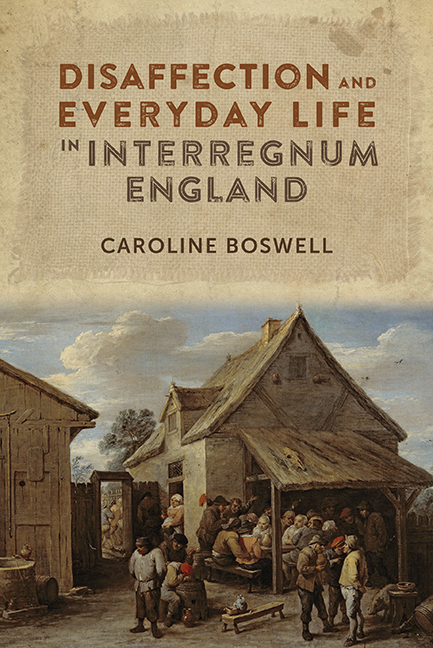Book contents
- Frontmatter
- Dedication
- Contents
- List of Illustrations
- Acknowledgements
- List of Abbreviations
- Introduction
- Part I Sites of Disaffection
- 1 Streets and Marketplaces
- 2 Drink and Disaffection
- Part II Objects of Disaffection
- Conclusion
- Bibliography
- Index
- STUDIES IN EARLY MODERN CULTURAL, POLITICAL AND SOCIAL HISTORY
2 - Drink and Disaffection
from Part I - Sites of Disaffection
Published online by Cambridge University Press: 23 August 2019
- Frontmatter
- Dedication
- Contents
- List of Illustrations
- Acknowledgements
- List of Abbreviations
- Introduction
- Part I Sites of Disaffection
- 1 Streets and Marketplaces
- 2 Drink and Disaffection
- Part II Objects of Disaffection
- Conclusion
- Bibliography
- Index
- STUDIES IN EARLY MODERN CULTURAL, POLITICAL AND SOCIAL HISTORY
Summary
In the mid-1650s many owners of inns, taverns and alehouses managed to keep their doors open and their customers in “drink” despite an increase in the regulation of alcohol and its consumption under the “Rule of the Major- Generals”. Keepers of orderly, well-trodden and visible drinking houses who offered sustenance to weary travelers, day laborers, local artisans and visiting merchants could still obtain a license from local justices. Such venues supplied their patrons with a place to rest their heads, a warm hearth on cold days and the camaraderie and conversation of good company. The Black Boy Inn served locals, travelers and traders in Aschott, Somerset for over forty years when the act of one tippler threatened its existence in December 1656. While socializing at the popular inn, William Higgory offered a customary toast (known as a “health”) to his fellow drinkers as an act of fellowship. Though health-drinking could serve as a social lubricant that forged or strengthened relationships among drinkers, Higgory's health paid tribute to the exiled Charles II rather than Lord Protector Oliver Cromwell. This was no slip of memory or drunken mistake, for Higgory allegedly declared, “Let us drink, let us sing, here's a health to our King, and it will never be well until we have one again”. The language of Higgory's health suggests that his design was to bond with his fellows through traditional customs of sociability – drink, song and loyalty – but the crowd's stunned response to the king's health recast his act as one of a social pariah. Rather than pledge Higgory's proffered health, members of the befuddled company allegedly asked whether Higgory was drunk, deranged or if he wished to be “hanged”. Though Higgory's health was blatantly seditious, the company's exasperated retort – which provoked Higgory's ire – suggests that the drinkers in the Black Boy wished to know why Higgory would openly state his opinions and force them upon others, not why he thought them. Concerned that Higgory's outburst had jeopardized the existence of this popular inn, several parishioners penned a “Certificate” defending the forty-year-old Black Boy as a “very suitable” establishment.
The primary concern of these men and women was to preserve this peaceful social site – particularly under the watchful eye of Major-General Disbrowe – not to punish Higgory for voicing his affection for Charles II.
- Type
- Chapter
- Information
- Disaffection and Everyday Life in Interregnum England , pp. 71 - 120Publisher: Boydell & BrewerPrint publication year: 2017

